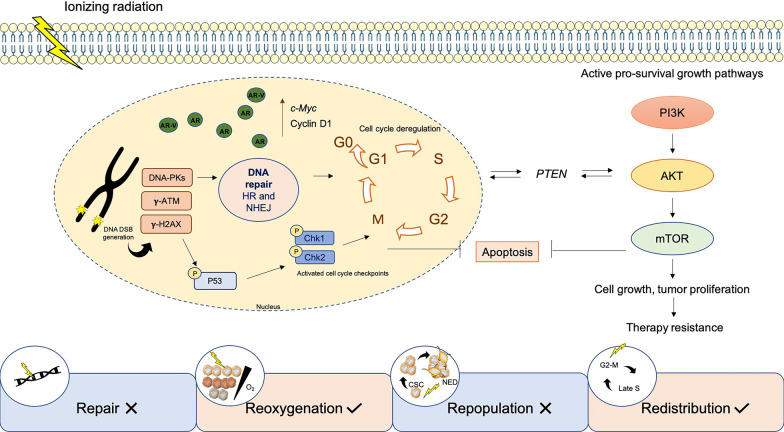Fig. 1.
Radiation-induced radiobiological molecular pathways in PCa. Ionizing radiation exposure leads to activation of pro-survival cell growth pathways, such as PI3K/Akt/mTOR, entailing efficient DNA DSB damage repair. Specifically, radiation-induced DNA-dependent protein kinases, γ-ATM and γ-H2AX accumulation, and activation of p53 and key factors involved in cell cycle progression, sustain cell growth and tumor proliferation. Furthermore, PTEN is reported to play a role in PCa radioresistance, sustaining cell cycle arrest due to Chk1 regulation in an Akt-dependent manner. All these changes induce PCa cell growth, proliferation, apoptosis evasion, and therapy resistance. This dynamic is supported by current knowledge of the classic R’s of radiobiology, including repair of DNA damage and aggressive cell repopulation, which improve overall tumor cell survival after radiation exposure. Conversely, reoxygenation of deeper layers and cell cycle phases redistribution allows greater therapeutic efficacy.: AKT, protein kinase B; AR, androgen receptor; AR-V, AR variant; ATM, ataxia telangiectasia mutated; ChK1/2, checkpoint kinase 1/2; CSC, cancer stem cells; HR, homologous recombination; mTOR, mechanistic target of rapamycin kinase; NED, neuroendocrine differentiation; NHEJ, non-homologous end joining; PI3K, phosphoinositide 3-kinase; PTEN, phosphatidylinositol 3,4,5-trisphosphate 3

